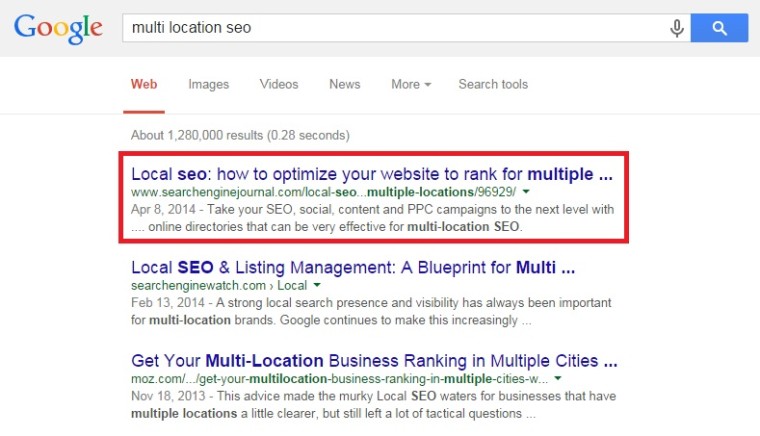Back in April, I wrote an article on Search Engine Journal that explained how to optimize a website to rank for multiple locations. Having worked for a company with over 45 independently owned locations across the country, I figured multi-location SEO would be a solid topic to write about because it was something that I was familiar with and it seemed like a topic many business owners would find useful.
But I never imagined this article would turn out to be such a great referral source. Not only did this one article generate a handful of clients, but it also helped me double my monthly revenue as a consultant.

This is a prime example of how guest blogging can help generate leads. From an SEO standpoint, the primary objective of a guest post has typically been to get a link back to your site. For a while, this was an effective way to build up your backlink profile. The strategy itself was pretty straight-forward: Find an authoritative site within your industry and offer them an article that is relevant to their target audience in exchange for a link.
Soon SEOs came to realize the link was all that really mattered, and content quality was essentially irrelevant in terms of the organic ranking benefit. Over the years, guest blogging (among other spammy SEO tactics) led to a massive influx of low quality content.
It all came crashing down (or so it seemed) in January of 2014, when Matt Cutts published a blog post that confirmed what many SEOs had been theorizing for many years—guest blogging is dead.
However, despite the dramatic headline, guest blogging hasn’t died–it’s just not the circus it once was.
When Matt Cutts said that guest blogging was dead, he was specifically referring to the use of guest blogging as a link building strategy. This makes a lot of sense, considering links were the main motivation behind most guest posts.
Going Beyond Link Building
But guest posting has a variety of benefits outside of just building links. Don’t worry, I’m not about to bore you with a long list you’ve probably seen countless times. Instead, I want to talk about how you can optimize your guest post outreach strategy to increase ROI and generate quality leads for your business.
Similar to how lead scoring helps tighten conversion funnels by pre-qualifying prospects, businesses can analyze topics and content styles in which their audience is most likely to engage. Typically, higher engagement leads to more conversions, which means reduced marketing costs and a higher ROI.
But when most people think of guest posting, they tend to focus solely on the link metrics, such as domain authority, linking root domains, etc. Although this data might tell us how likely a site is to rank well in search results, they don’t really tell us much about the website’s audience.
When you’re building links, relevancy usually means the site aligns with a specific industry or topic. But, when you shift your focus to lead generation, things get a little more complicated. The lesson to be learned: Relevancy is relative to your objective.
Here are a few considerations to help establish relevancy for effective lead generation:
Establish Yourself as an Authority
[pullquote]Would you consider yourself an authority in your industry?[/pullquote]
In the good ‘ole days of guest blogging, the author bio was a prime place to include a link back to your website. But now that you’re going after more than just links, you can use your author bio –and even the post itself– to help establish yourself as a thought leader within your industry.
In the article I mentioned above, I never disclosed that I own an SEO consulting agency, nor did I include any links to my website within the article itself. But since my author bio mentioned I offer consulting services and included a link to my website, I received nearly 20 inquiries, of which approximately half converted into real clients. I found this interesting because even though I pretty much spelled everything out for them in terms of the strategy, they still wanted me to handle the implementation.
Since I used the company I worked for as an example, I was able to provide proof that what I was saying in the article really works. By establishing this sense of authority, businesses felt a lot more confident that I could help them, which made the conversion process a whole lot easier.
If you can establish trust with a potential client before the initial point of contact, then that’s half the battle right there.
Choose the Right Topic
Most websites worth their salt aren’t interested in publishing topics that have been covered extensively in the past. To give you an idea, Search Engine Journal turns away 10-15 potential contributors for every one they accept.
Don’t get me wrong, there are plenty of sites desperate for content who will publish anything you throw at them–especially if you’re covering a trending topic that’s relevant to their industry. But if you’re targeting an authoritative site, most editors are looking for new topics and a fresh perspective. They are looking for something that adds value for their readers.
Just be careful not to bite off more than you can chew. Targeting topics is a lot like targeting keywords. By covering too many topics within the same article, you’re diluting the value of each topic. Try to choose topics that are specific enough for you to cover thoroughly. This helps establish credibility.
For instance, if I wrote a general overview of local search, it would have been difficult to really delve into all of the nitty-gritty details and as a result the post wouldn’t offer much insight. But when I concentrate on only one facet of local search, like I did on multi-location SEO, I’m able to sharpen my focus so I can provide a more comprehensive overview, which gives me a better opportunity to offer something of value.
There are exceptions, like this super in-depth, beginners guide to link building by Paddy Moogan. However, unless you can commit to something of that magnitude, I’d recommend sticking with something you can cover in less than 2,000 words.
Choose the Right Site
After you choose a topic, it’s time to figure out where your guest post will be published.
When you begin vetting sites for lead generation, you should look beyond domain authority and industry relevance. How large of a social following do they have? How engaged are their followers? Are there a lot of social shares for posts by other guest authors?
Although this type of analysis may seem pretty straightforward, it can become very tedious. When I was contemplating which site would be a good fit the multi-location SEO article, I had several sites in mind and to be honest, SEJ was not my first choice. But after some digging, I came to the conclusion that based on the total number of shares and community engagement for local SEO-related articles, SEJ seemed to offer the best value.
Remember, social sharing gives you exponential reach–especially with a website that averages over 600,000 monthly visitors. The authoritative domain also provided an added SEO benefit. You may not be chasing links, but a site’s authority can mean higher search visibility for your content. If you search “multi-location SEO” in Google, my article is the first result you see. It would be a lot more difficult for me to rank for a term like this if the content resided on my own domain, which has only a fraction of the authority.

Choosing the right site means more views, more shares, more links, more search visibility, and of course, a greater potential for leads.
Define Your Qualifying Factors
Any business owner who uses lead generation knows some leads are more qualified than others. That’s why it helps to have some conditions you can target.
In my case, the multi-location aspect was a pretty good qualifying factor itself. If a business has multiple locations or if they’re looking to expand their territory, that’s usually an indicator that they have the budget for SEO.
For most businesses, price is one of the most common pain points when it comes to closing a sale. In this case, I’ve eliminated this deterrent by choosing a topic that only applies to businesses that meet specific standards. This type of filtering also works great if you’re trying to target specific regions.
If you’re a business with multiple locations, then why not offer content to some of the sites that cater to your individual local markets? If you’re using a scattershot approach to generate leads from guest posts, you’re just spinning your wheels.
Putting it All Together
Guest blogging isn’t dead. It just takes a lot more time and effort to do it right. So don’t nail the coffin lid shut just yet. If you’re abiding by Google’s Webmaster Guidelines, there really isn’t much difference between guest posts and any other type of authored content. As long as you continue to produce engaging, quality content, guest blogging is still a great strategy for branding, exposure, and increasing your businesses reach.
I think as content marketing continues to evolve, a lot more businesses will begin optimizing their guest post strategy for lead generation and customer acquisition. Who knows, if you approach guest blogging the right way, you might get even that coveted link after all. I know I said this isn’t about link building, but a legitimate backlink from a reputable site is a nice bonus.
Image Credits
Featured Image: Orletskyyyy via Shutterstock
Image #1: milo827 via Shutterstock
Screenshot taken September 2014





